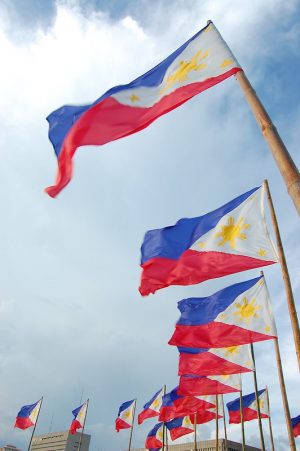The U.S. and the Philippines are likely to reinforce the imperiled Visiting Forces Agreement (VFA) between the two countries, Philippine Defense Secretary Delfin Lorenzana said on Wednesday, ahead of U.S. Defense Secretary Lloyd Austin’s planned visit to the Philippines next week.
Speaking during a pre-State of the Nation Address forum, Lorenzana said that the VFA will likely be a major topic of conversation with Austin during his stop in Manila, which will be part of a three-nation Southeast Asian tour. Lorenzana said that the agreement would likely receive an addendum addressing a number of Philippine concerns about the current provisions of the pact.
“The VFA is not being changed, the document will not be changed, but there will be some addendum, side agreement to implement the VFA,” Lorenzana said Wednesday. “Once it is signed by the President, it will be an official document attached to the VFA.”
President Rodrigo Duterte announced the scrapping of the VFA in February 2020 in a fit of pique after a close ally was refused a U.S. visa for his role in the administration’s violent and extrajudicial “war on drugs.” But the maverick leader has since demurred, announcing three successive six-month stays of the suspension.
The most recent stay came last month, when Duterte ordered his officials to study the matter and in order to grant both nations the space to “further address his concerns regarding particular aspects of the agreement,” in the words of Foreign Secretary Teodoro Locsin.
A crucial element of the security alliance between Manila and Washington, the VFA lays out rules for the deployment of U.S. troops in the Philippines. But it has also spurred opposition. Some view the accord as a symbol of the country’s continuing dependence on its former colonial overlord, and claim the VFA has allowed U.S. personnel to avoid punishment for crimes committed in the Philippines.
Lorenzana’s comments suggest that the beleaguered accord is likely to survive Duterte’s single term in office, after five years in which the leader has spurned the U.S. and steered his country’s foreign policy in China’s direction.
This has happened despite the fact that the Philippines has faced intensifying pressure from China, including its deployment of swarms of Chinese maritime militia vessels in disputed portions of the South China Sea. This is of course precisely the reason why the Philippine defense and foreign policymaking establishment wants the VFA to remain in place, and has fought to ensure that Duterte does not follow through on his threat to abrogate it completely.
The reported pending agreement thus reflects the strong incentive of officials in both Manila and Washington to ensure that the rudiments of the security alliance, which marks its 70th anniversary this year, survives the Duterte administration. It also suggests that once Duterte is out of office, U.S.-Philippine relations will return to their friendly historical norm.
The only catch is the approaching 2022 presidential election, and the array of Duterte allies lining up to succeed the 76-year-old leader. To be sure, the exact line-up of candidates remains unclear, and it has been unusual in recent Philippine history for a president to be followed by his or her anointed successor.
But Duterte is unusual in continuing to enjoy sky-high approval ratings. In October of last year, public opinion polling by the local outfit Social Weather Stations found that the Philippine leader enjoyed an approval rating of 91 percent, which the Inquirer described as “a feat not seen since polling started in the post-Marcos era” in the late 1980s. Until the final votes are counted next May, the prospect of another six years of Duterte-style foreign policy will continue to hang over the U.S. alliance.

































